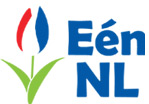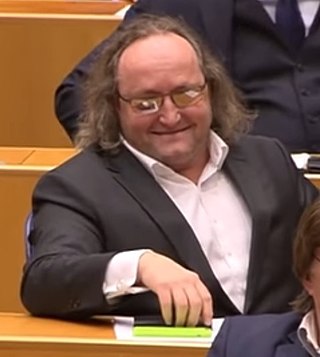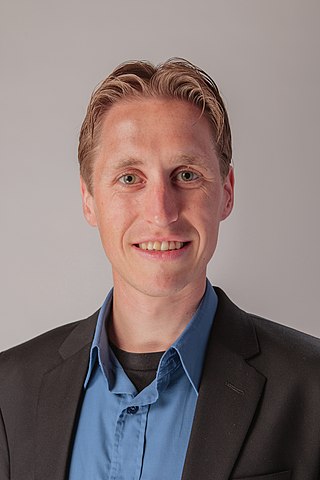
The second Balkenende cabinet was the executive branch of the Government of the Netherlands from 27 May 2003 until 7 July 2006. The cabinet was formed by the Christian-democratic Christian Democratic Appeal (CDA), the conservative-liberal People's Party for Freedom and Democracy (VVD), and the social-liberal Democrats 66 (D66) after the election of 2003. The cabinet was a centre-right coalition and had a slim majority in the House of Representatives with Christian Democratic Leader Jan Peter Balkenende serving as Prime Minister. Liberal Leader Gerrit Zalm, a former Minister of Finance, served as Deputy Prime Minister and returned as Minister of Finance, while former Progressive-Liberal Leader Thom de Graaf served as Deputy Prime Minister and Minister without Portfolio for the Interior.

The Senate is the upper house of the States General, the legislature of the Netherlands. Its 75 members are elected on lists by the members of the twelve States-Provincial and four electoral colleges for the Senate every four years, within three months of the provincial elections. All provinces and colleges have different electoral weight depending on their population.

Maria Cornelia Frederika "Rita" Verdonk is a Dutch politician and businesswoman formerly affiliated with the People's Party for Freedom and Democracy (VVD) and later Proud of the Netherlands (TON), which she founded in 2007. Since 2022, she has been a municipal councillor of The Hague, elected on the list led by Richard de Mos.

Eén NL is a Dutch political party founded in September 2006. It took part in the 2006 Dutch election under the leadership of Marco Pastors and Joost Eerdmans, but a dismal election result leaves the political future of the party quite uncertain. The party is seen as one of the political heirs of the late Pim Fortuyn.

Dion Jean Gilbert Graus is a Dutch politician. He has been an MP on behalf of the Party for Freedom since 30 November 2006.
According to research done by the Organisation for Economic Co-operation and Development (OECD), the Netherlands is ranked with Switzerland in having the most broadband subscriptions per 100 inhabitants, has no bandwidth caps, and has the most homes passed in Europe in terms of connection speeds of 50 Mbit/s and higher.

Edith Ingeborg Schippers is a Dutch politician of the People's Party for Freedom and Democracy (VVD) and businesswoman who served as President of DSM Netherlands between 2019 and 2023.

Pieter Herman Omtzigt is a Dutch politician who has served as a member of the House of Representatives since 2003 apart from a short interruption between June and October 2010. He was member of the Christian Democratic Appeal (CDA), but left in 2021 and continued as independent. In August 2023, he founded a new party called New Social Contract, its name taken from his 2021 manifesto. Three months later, his party won 20 out of 150 seats in the 2023 Dutch general election.

Maria Cornelia Gezina "Mona" Keijzer is a Dutch politician and former civil servant who is the minister of housing and spatial planning in the Schoof cabinet since 2024. A member of the Farmer–Citizen Movement, she won a seat in the House of Representatives in the 2023 Dutch general election.
Citizenship education for new citizens is education intended to prepare noncitizens to become legally and socially accepted as citizens, and is carried out by a variety of governmental and non-governmental organizations (NGO).
CNaVT, or Certificaat Nederlands als Vreemde Taal, is an internationally recognised certificate proving the language ability in Dutch language of the holders. To obtain the certificate, Dutch learners must pass the CNaVT examination, organised by the Catholic University of Leuven and Radboud University Nijmegen. The Dutch Language Union has commissioned this collaboration. CNaVT is also a member of the Association of Language Testers in Europe (ALTE). The examinations is set according to different levels in the Common European Framework of Reference for Languages and is offered in accordance to various needs of the examinees. The certificate is widely recognised as proof of ability in Dutch in the Netherlands and Belgium and is useful for immigration, work and admission to educational institutions.
Staatsexamen Nederlands als tweede taal, often abbreviated as Staatsexamen NT2, is a standardised examination of Dutch language for those who are not native speakers of Dutch. By passing the State Examinations NT2 candidates can show that they have sufficient command of the Dutch language to be able to work or study in the Netherlands.

Michiel van Nispen is a Dutch politician, he has been a member of the House of Representatives of the Netherlands for the Socialist Party since 2 April 2014, when he replaced Jan de Wit.

Denk, legally registered as Politieke Beweging Denk, is a political party in the Netherlands, founded on a minority rights platform.

Bente Becker is a Dutch politician of the People's Party for Freedom and Democracy (VVD).

Stephan Ruben Tobias van Baarle is a Dutch politician. A member of the minority interest party DENK, he served on the Rotterdam municipal council from 2018 to 2022. He was elected to the House of Representatives in 2021 and succeeded Farid Azarkan as DENK's parliamentary leader two years later.

Mariëlle Lucienne Josepha Paul is a Dutch politician. A member of the conservative liberal People's Party for Freedom and Democracy (VVD), she was elected to the House of Representatives in the 2021 general election, and she became Minister for Primary and Secondary Education as part of the fourth Rutte cabinet in July 2023. She continued with the same portfolio in the Schoof cabinet as State Secretary for Primary and Secondary Education and Equal Opportunities starting in July 2024. Paul previously worked as a communications director for several multinational corporations.

Wieke Paulusma is a Dutch health professional and politician for the social liberal party Democrats 66 (D66), who has been serving as a member of the House of Representatives since the 2021 general election. She started her career as a nurse and also worked as a health care manager. Besides, Paulusma served on the Groningen municipal council between 2014 and 2021.

Henk Staghouwer is a Dutch administrator and Christian Union politician. He served as Minister of Agriculture, Nature and Food Quality in the fourth Rutte cabinet from 10 January to 5 September 2022. From 24 April 2013 to 10 January 2022 he was a member of the provincial executive of Groningen.
The Dispersal Act, formally known as the Asylum Reception Facilities in Municipalities (Enablement) Act, is a Dutch statute intended to better distribute asylum seekers across municipalities. Introduced by Minister for Migration Eric van der Burg, it was passed by the House of Representatives in October 2023 and by the Senate in January 2024.














